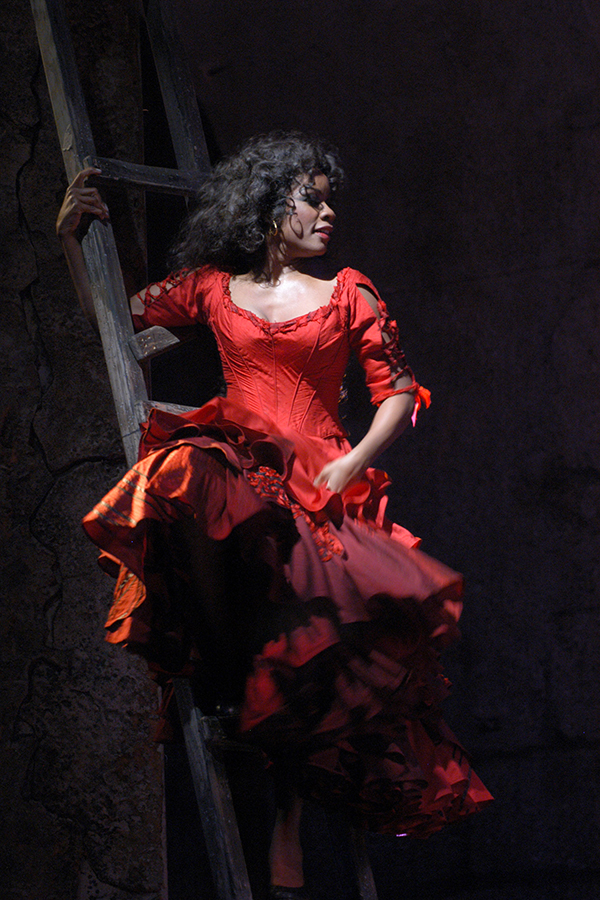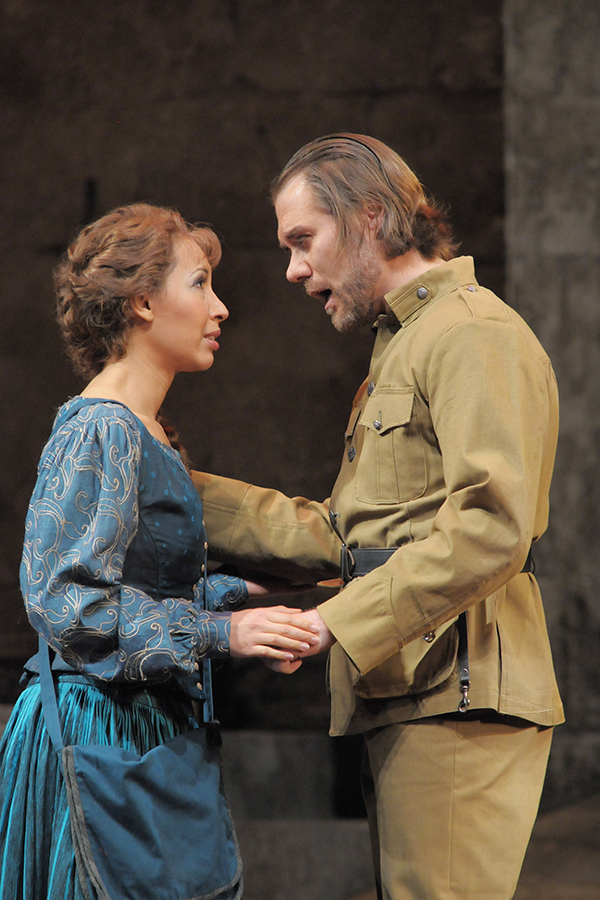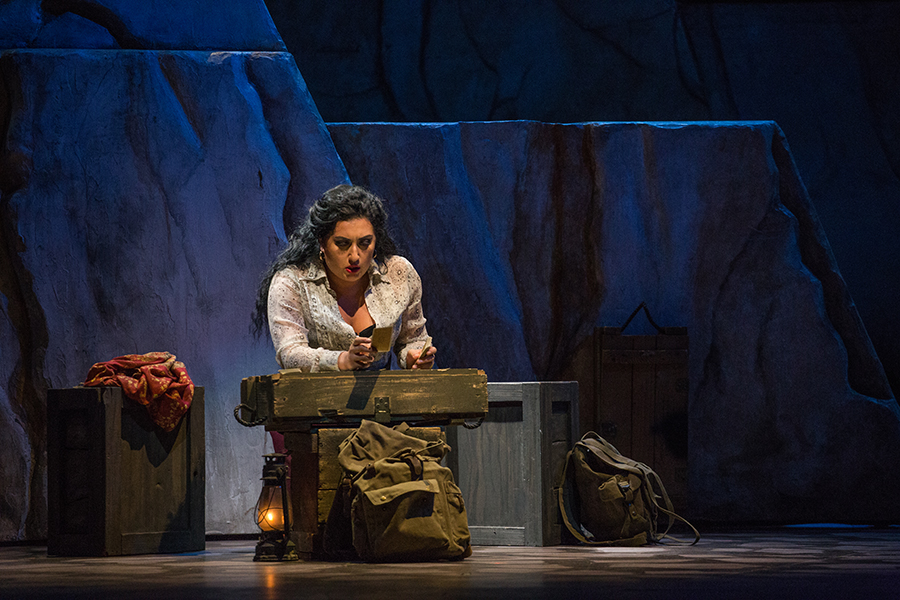February 28, 2023
Carmen’s freedom
Is the heroine a victim of a judgmental society or a feminist icon? Or something far more complex? The character continues to intrigue us because she defies easy categorization.
In any list of the most-performed operas, Georges Bizet's Carmen (1875) ranks at or near the top. It has even been called a "perfect opera," and this seems justified. The work has everything: daring, melodically and harmonically complex music, with superb orchestration and intricate ensembles; local color and a vivid sense of place and time; and, perhaps above all, compelling characters who have fascinated audiences for many decades — ever since its disastrous first night, when it was denounced on all sides for immorality. It has won the admiration of composers as diverse as Brahms (who saw it 20 times), Tchaikovsky, Massenet, and even Wagner, who exclaimed, "Here at last for a change is someone with ideas!" The philosopher Nietzsche, meanwhile, thought it the best antidote to what he took to be Wagner's otherworldly pieties about love. Unfortunately its creator died before he could see the success his wonderful creation attained, after the initial shock it delivered to a conservative Paris music world.

Denyce Graves as Carmen in Lyric's 2005/06 production.
Carmen got its start when Bizet, a musical prodigy and defiant anti-conservative, along with his librettists, Henri Meilhac and Ludovic Halévy (nephew of the composer Fromental Halévy, who had been Bizet's teacher), proposed to the directors of the Opéra Comique an opera based on Prosper Mérimée's novella Carmen (1845). One director approved, but his more conservative partner objected. Halévy placated him (so he reported 30 years later) by promising a "softer, tamer" heroine, and the inclusion of a virtuous young girl, not in the Mérimée, as a counterpoise to the shameless Carmen. He also promised that Carmen's death would be "glossed over" by a noisy public celebration. Whether he was insincere, or whether Bizet successfully fought with them for his own ideas, neither of these promises was kept. The death of Carmen is searing, its effect only heightened by the contrasting offstage music of the bull ring. And, as we shall see, Micaëla's character and function are more complicated than the librettist revealed, or, perhaps, knew. In many respects, the opera followed its source, emphasizing Carmen's transgressive insistence on freedom, though with significant changes that heighten the allure of its heroine and weaken the character of Don José. In Mérimée, we learn the story of Carmen and Don José through a male narrator, a detached intellectual who is doing research on the history of the Roman Civil Wars.
He meets up with a band of Roma people, and eventually hears from Don José himself the story of his tragic obsession, as the outlaw lies in prison after having killed Carmen. Thus, the story is mediated through two layers of male narration. In the opera, by contrast, we are confronted by the characters with no filter, and we respond to their immediacy with our own complicated emotions. Carmen becomes more dangerous, her insistence on freedom more threatening. She certainly does not seem "softer, tamer." Indeed, the libretto removes some details that serve to soften her (her skill as a healer, her impressive fluency in many different languages), leaving the accent squarely on her outlaw daring and her transgressive sexuality. Don José is altered too: He is not Mérimée's Satanic master-brigand; he is a naïve soldier from the country who never chooses the life of crime, but is led helplessly, pathetically, into dishonor by an overwhelming passion.
Micaëla is indeed an addition, but in Bizet's hands she becomes far more interesting than the "virtuous girl" promised by Halévy. First of all, she exemplifies courage and autonomy as much as Carmen does. Pursuing her attachment to both José and his mother, she ventures into extremely hostile terrain not once but twice. She searches for José at the soldiers' barracks, where they rudely taunt her and seem bent on sexual assault; later she braves the mountain haunt of the smugglers all alone (with only an employed guide). So although she is a conventional woman, exemplifying bourgeois virtues, she is an unconventionally strong and daring conventional woman, and her soaring lyricism is as memorable as Carmen's much more radical and daring music. Second, her presence in the opera shows us something significant about Don José — namely, that he is at home in her bourgeois world and not at all at home in the world of the outsiders. (Mérimée's Don José, by contrast, is a natural brigand, who quickly rises to the head of the criminal gang.) From the moment they sing together, we hear how easily he slides into the phrases of her bourgeois lyricism — whereas the "Flower Song" that he addresses to Carmen, overheated and slightly crazy, shows us a man driven by some alien force to be what he cannot manage to sustain. He loves Carmen because she is not Micaëla, but he keeps trying to turn her into a bourgeois wife. We see, then, the tragic misfit in his passion.
One more character has been added: Escamillo, who replaces Mérimée's young picador, Lucas, as Carmen's lover. He is depicted as vain, bombastic, and highly conventional, and Bizet gave him music that he himself despised, though he knew full well that the public would embrace it. ("If they want trash," he said, "I'll give them trash.") In the score, Escamillo's signature aria is even marked avec fatuité (conceitedly). In an important sense he is Micaëla's counterpart, the man suited for Carmen. He understands her need for sexual freedom, which suits him perfectly, since he has no capacity for deep passion. He is glad to tell everyone that each of Carmen's loves lasts only six months. Meanwhile he will enjoy her and show her off. Such a lover perfectly fits Carmen's own desire to avoid deep love and its vulnerabilities.

Patrick G. and Shirley W. Ryan Opera Center alumna Nicole Cabell (Micaëla) and tenor Brandon Jovanovich (Don José) in Lyric's 2010/11 production of Carmen.
But we must now introduce one further source. In 1827, the great Russian poet Alexander Pushkin published a long narrative/dramatic poem, The Gypsies, which was clearly a source for Mérimée, who translated it into French in 1852. We know that Meilhac and Halévy had that translation and used it, but there are decisive reasons to believe that Bizet read it too. Bizet was utterly dissatisfied with the libretto text of the Habanera, and completely rewrote it, again and again, with the help of his Carmen, the singer Galli-Marié, until he was finally satisfied. It was during these rewrites that the phrase "un oiseau rebelle" (a rebellious bird) was introduced. This phrase does not occur in the Mérimée novel. But the bird is in Pushkin, as an image of the restless freedom of the Roma world. So: Bizet knew Pushkin.
Pushkin is important because his poem contains insights about freedom and the bonds of passion that are not present in Mérimée, but prove central, I believe, to Bizet's opera. The poem, dramatic in form, tells the story of a young man from the city who is drawn to the Roma world and forms a liaison with the beautiful Zemfira. He does not understand the relaxed and tolerant mores of the Roma people, called by Pushkin "children of a humble freedom," and is determined to possess Zemfira, despite her own preference for freedom. When she has an affair with a man from her own community, he kills her — and is immediately dismissed from the Roma world, since, as the Roma elder says, his people cannot live with murderers: "Not for freedom were you born,/ You want it for yourself alone."
The poem clearly prefers the Roma world to the urban bourgeois culture that teaches young men to dominate women: "We are shy and good at heart," says the elder. This might suggest that these outsiders are immune to the darker passions. But in the end the poet doesn't agree. As the poem concludes, he tells us that there is no lasting happiness in that "innocent" world either. Even there, violent emotions surge up in dreams and presage disaster: "Catastrophe in hiding waits,/Dark passions everywhere run deep,/There is no refuge from the Fates."
Bizet's message, I think, is Pushkin's. The opera sympathizes with Carmen and her demand for life on her own terms. It characterizes Don José's possessiveness as both ugly and pathetic, part of a culture of misogyny that is also suffused with racialized "othering" of the Roma, who simply want to live on their own terms. To that extent, the political stance of the opera is diametrically opposed to that of the conservative critics who assailed it for immorality and lawlessness, and to those who continue to see in the opera's tragic ending the just punishment of a woman who defies society's rules. But its message is not the inverse of that message either, as some recent feminist critics have alleged, portraying Carmen as a feminist icon. These critics, on the whole, see the ending either as Carmen's defeat at the hands of a world order that cannot comprehend her, or else insist that she has triumphed after all, by living her life with integrity and refusing to yield, right up until the end.

Anita Rachvelishvili sees her fate in the tarot cards in our 2016/17 production of Carmen.
There is a different possibility, suggested by Pushkin: We may see Carmen as fettered, so to speak, by human life and the vulnerability that is inexorably part of it. What both the victory-of-patriarchy critics and the feminist critics omit is the great unanswered question of the opera: Why does Carmen meet José outside the bull-ring, and stay there until he kills her? She has a happy new relationship, but she walks away from her new lover's big moment in the ring to meet an ex-lover whom she has dismissed and does not love. This makes no sense for a feminist Carmen: She should have gone her own way and ignored him. She could have left town, as Frasquita advises, or, more likely, sought the shelter of the crowd and Escamillo's victory. Instead she waits for him, not attempting to leave until it is clear he is going to kill her. Why? She does not love José. But there is something about him that draws her fatally (for she is a fatalist). Isn't it the sheer gaping vulnerability of his huge passion, his sheer willingness to give his whole life for love? Perhaps, then, it is a desire for passion, for being bound and vulnerable, that makes her compromise her freedom? (As Janis Joplin said to my hippie/rebel generation, with its own rejection of the bonds of love, "Freedom's just another word for nothing left to lose.") Carmen longs, in the end, to be human — so death is what she seeks, and gets.
Interpretations that speak of fatal passion, as mine does, are accused by some recent critics of "depoliticizing" the opera. But opera characters are not simply abstract templates for political positions; they are complex human beings, and that is why they move us (and why opera moves us). Even though Carmen invites many reflections about race and class and gender — clearly solicited by Bizet, an atheist and a rebel — the opera also shows its people as searching for something deep about their condition, something that they try to grasp, even at their peril.
Andrew Biondo provided research assistance for this essay.
Martha C. Nussbaum is the Ernst Freund Distinguished Service Professor of Law and Ethics at the University of Chicago, appointed in the Law School and the Philosophy Department. Her most recent book is Justice for Animals: Our Collective Responsibility (2023).

